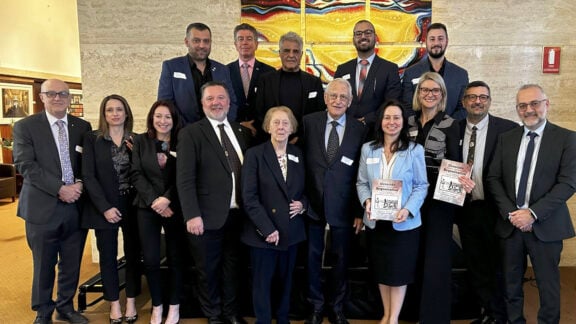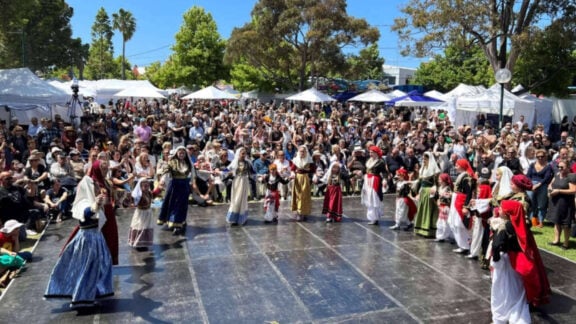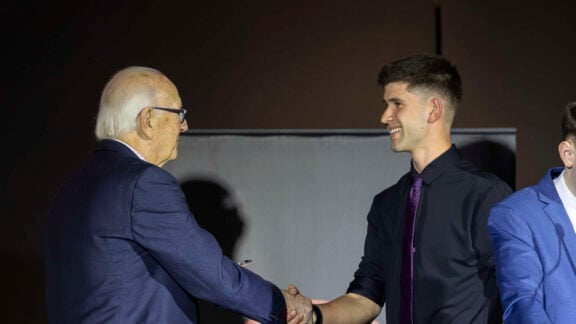The news of Rupert Murdoch departing from the helm of his media empire, News Corp, dominated Australian and international media.
The international press focused on Murdoch’s trajectory, how, from 1954, when the Adelaide tabloids, Sunday Mail and The News, came into his inheritance, he was able to establish a global media behemoth with mastheads and television in the UK and the USA, and of course the conservative Fox News. The media empire Murdoch built over seven decades, starting with a single newspaper in Adelaide, spans three continents.
Murdoch’s Zorba
However, what has been omitted is his Greek-Australian connections. During a challenging phase of his business in Australia, Rupert Murdoch found assistance from a Greek publisher, Theodore Skalkos.
In a Neos Kosmos article, Professor Anastasios Tamis describes Theodore Skalkos as “the most innovative, the most inventive publisher of a newspaper conglomerate not only in Australia but possibly across the entire Greek Diaspora.”
Skalkos, a pioneer in Greek-language and foreign-language press, introduced offset printing in the Greek media.
“He was the first to use machines that printed thousands of newspaper sheets, applied fax mailing as a means of direct communication, and established vast paper warehouses in Sydney and Melbourne, offering refuge and salvation even to the media magnate Rupert Murdoch during challenging days,” Prof Tamis writes.
So, when Murdoch could not find a printer, Skalkos jumped in to print Murdoch’s newspapers in Melbourne.Murdoch often referred to Skalkos as “Zorba”. Skalkos’ assistance helped Murdoch expand in the 1980s.
For decades, Neos Kosmos and Nea Ellada were printed in Murdoch’s facilities in Melbourne.
Murdoch was always a controversial figure. For some, his departure may mean a reduction in his media empire’s influence. Many on the progressive side see Murdoch and his Fox News as toxic and threatening to democracy.
For conservatives, Murdoch represent a ballast to what they perceive to be an overwhelming influence of the left in policy and culture.
Regardless of what one thinks of Murdoch, what is undeniable is that a parochial little Adelaide produced the most influential media moguls in modern times.
Every leader in the Anglosphere courted Murdoch to seek his imprimatur. Equally, the same leaders often decried his influence when Murdoch decided their time in office was up.
What is evident is that there would never be another like him.
“It’s impressive how a man led the most powerful family in the world, built a family fortune of 30 billion Australian dollars, and influenced global affairs for decades,” said Steven Main, a former News Corp journalist who became an activist shareholder and extensively investigated Murdoch’s company deals in 15 annual shareholder meetings since 1999.
“Unfortunately, certainly in recent years, much of this legacy has been toxic,” Main added, citing Murdoch’s media promotion of falsehoods about the 2020 US presidential elections and his climate change denial, among other things.
Even in the new digital when we consume media outside traditional channels, especially among young people, Murdoch’s influence has been ingrained in the country’s media ecosystem due to its massive reach.
The behemoth
The influence of News Corp remains unparalleled in Australia, which owns about 60 per cent of the nation’s daily newspapers, including the national The Australian.
Murdoch also owns Sky News, a cable news channel modelled on Fox News.
“What is published in The Australian is broadcast a second time through Sky and a third time through local daily newspapers,” says Sean Hogan, head of the School of Media, Film, and Journalism at Monash University.
“Murdoch’s newspapers continue to have a large audience among the working class and continue to have an impact,” he adds.
That’s why Australian politicians from across the ideological spectrum maintain friendly relations with the company, unlike in other markets where left-wing lawmakers were more likely to avoid it, according to Hogan.”He did immense damage to the democratic world.”
When the ABC asked Federal Treasurer Jim Chalmers if Murdoch’s media had mistreated the Labor Party, he refrained from passing judgment.
“The body of work is here for everyone to see,” Chalmers told ABC.
Foreign Minister Penny Wong, when questioned by reporters in New York about Murdoch’s departure, said, “Any fair observer could say that some of the newspapers might not have exactly praised the Labor Party, but that’s something that happens in a democracy. “I wish him a good retirement.”

Rage and loathing
Some took a less measured approach, like the former Liberal Prime Minister Malcolm Turnbull.
“The financial pages will praise him for the success of Fox and News Corp, but he has done massive damage to the democratic world.
“The culture of anger that Fox News, above all, has created in the United States has left behind an angrier and more divided America than ever since the Civil War,” Turnbull told the ABC.
A few years ago, former Labor MP, Kevin Rudd, called for a royal commission into media diversity and called Murdoch an “arrogant cancer on our democracy.”
In the UK, Murdoch and his older son were forced to front the Leveson Inquiry into phone hacking by their now-defunct News of the World .
Employees of the newspaper engaged in phone hacking, police bribery, and exercised improper influence in the pursuit of stories.
In 2011, it was revealed that the phones of murdered schoolgirl Milly Dowler and victims of the July 7, 2005, London terrorist attacks had been hacked.
The public outcry against News Corporation and Rupert Murdoch led to high-profile resignations, including that of Murdoch as News Corporation director.
Succession lite
Murdoch’s exit severs a genetic link between News Corp and Fox Corp, and Australia, where Murdoch was born. His son, Lachlan Murdoch, the sole chairman of News Corp and CEO of Fox, was born in the UK. Lachlan Murdoch, whose wife is Australian, lives in Sydney with his family and commutes to the United States, where both companies are based.
Meanwhile, Australia continues to play a significant role in Murdoch’s companies.
News Corp’s coverage of the 2019 devastating wildfires in Australia denied the impact of global warming, which drew criticism from Murdoch’s other son, James Murdoch. A few months later, he resigned from the company’s board, citing disagreements over editorial content.
Lachlan Murdoch looks like he will maintain the conservative and populist narrative of News Corp – especially Fox News and Sky.
The question is whether he will command the same power, exhibit the same iron will, cunning, and, importantly, his father’s visceral love for the press and media. The other question is what will the other children do? And will board activists find an opportunity to challenge News Corp’s approach to news? It would almost make a television series…oh hold on, it has.









